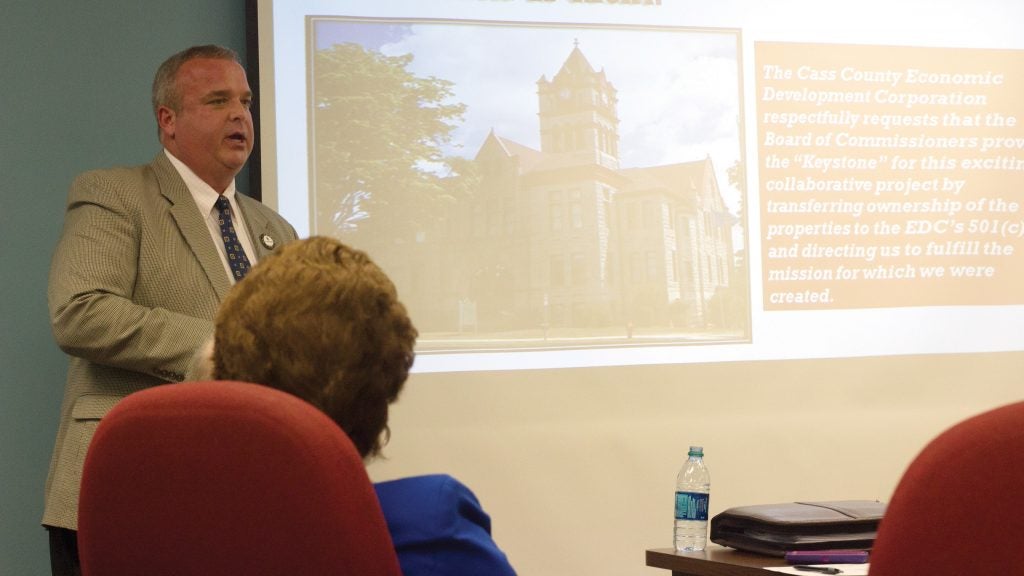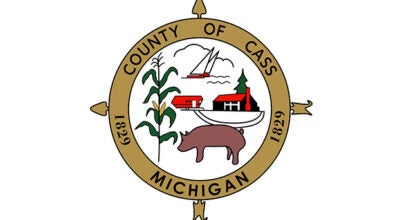EDC chairman makes case for control of vintage courthouse
Published 10:33 am Tuesday, November 7, 2017

- (Leader photo/TED YOAKUM)
CASSOPOLIS — What has stalled Cass County leaders’ efforts to renovate the 1899 historic courthouse has not been negligence or lack of care.
Rather, it has been the opposite. The slow progress made to repair and reuse the former seat of county power, which has sat dormant for nearly 15 years, has been because the board of commissioners and other county authorities have been focused on getting everything right — because they only have one opportunity to do so.
That is the assessment of Cass County Economic Development Corporation Chairman Troy Clay, who believes he and his agency may have the perfect solution to get the wheels on the ongoing project spinning once again.
Clay, on behalf the county EDC, delivered a presentation to the Cass County board of commissioners prior to its meeting Thursday in the county annex building in Cassopolis, on why the economic development organization should take over stewardship of the courthouse and the effort to reopen it for either private or public use. Clay’s visit followed his initial pitch to the county board in August, at which time the leaders requested that he return with a more fleshed out presentation.
Clay, who came prepared with a PowerPoint presentation, told the seven-member board Thursday about why he believes that efforts to renovate the former courthouse — closed since the opening of the Cass County Law and Courts Building in 2003 — have been slow coming since the commissioners began focusing on the issue in 2013.
In August, the board had scheduled a vote on whether or not to retain ownership of the courthouse, and create a millage to fund its repair, or to sell the building to a private developer, though the decision was tabled.
With the EDC’s support, though, Clay said the time is right for the county to really drive the courthouse project past the road blocks.
“We [the county] don’t want it to get it wrong, because we are so passionate about our history, so passionate about the courthouse,” Clay said. “We [the EDC] are here as a new option, designed specifically to get it right.”
Clay’s proposal calls for the EDC — an organization created in 1980 with the goal of promoting economic growth and business development in Cass County — to take over ownership of the former courthouse, located next to the current county annex at the corner of Broadway and State streets in downtown Cassopolis. After assuming control of the property, a 501(c)(3) nonprofit created by the EDC will manage the project, and will bring together a board of experts, such as architects, engineers and business developers, who will look for ways to secure funding to repair the mothballed structure and to find a possible way to reuse it.
The EDC board voted to create the 501(c)(3) to handle the courthouse and other possible real estate projects in Cass County in September, with the goal of getting these properties rebuilt and back on the market, Clay said.
“We anticipate a lot of properties going through this 501(c)(3), because we want to get to work,” he said. “Otherwise we will just be a bunch of people sitting around talking strategy. There is nothing more frustrating sitting around a table with a group people, who all have lofty goals but never execute.”
As the EDC is still a public organization, residents of Cass County who are concerned about the direction of the courthouse project will still have input into the process, Clay said.
“People are patently passionate about that building right there,” Clay said, gesturing toward the former courthouse, which is connected to the county annex. “That’s great, because we can take that [passion] and move forward.”
While several commissioners seemed receptive to Clay’s presentation, others felt the board should answer a few questions, including whether or not the county would still be liable for possible injuries inside the building, before they vote on whether or not to hand the keys over to the EDC. County leaders will be seeking legal advice on the potential ownership transfer in the near future.





